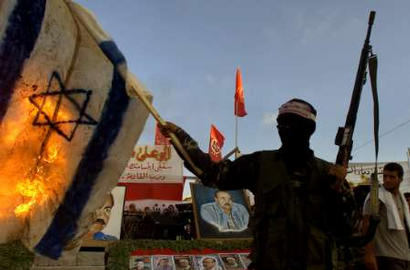
Israel is a tiny nation, roughly half the size of Lake Michigan. Its population is roughly half the size of the New York metropolitan area. Despite being a Jewish state, more than twenty percent of its residents are Arab and most Jews in Israel describe themselves as secular rather than religious.
Yet if one were to read world press accounts or daily condemnations from the United Nations or the recent decision of the ICJ criticizing the construction of the fence, you might conclude that Israel is a world power intent on destabilizing Middle East affairs.
Why, it might well be postulated, does the world resent this speck of land between the Jordan River and the Mediterranean?
Although my comments are speculative, I suspect they could be borne out empirically if historical accounts were fair and objective.
Israel is a thorn in the side of the Arab world because it is a remarkable technological phantasmagoria. Almost every Israeli is engaged in a software scheme. The Jews in this arid nation have made the deserts bloom; they have converted brain power into technical marvels and consequent wealth.
By contrast every nearby Arab nation is dysfunctional. Their governments are tyrannical; the people are poor and uneducated and local officials have been unwilling to convert oil revenue into social benefits.
Resentment is the natural result of this contrast. Afterall, Israel has all of the geographic disadvantages of its neighbors and it doesn’t have any oil fields. Yet it prospers, while others falter.
Second, it should be hastily noted that Israel is a proxy for anti-American sentiment. The misguided belief that the U.S. is an imperial power eager to put its stamp on the Middle East is demonstrated by the aid and support given to Israel. Rarely, is it noted by U.S. detractors that American assistance to Egypt is equal to aid for Israel. Moreover, American involvement in Iraq was neither precipitated by Israel (Does the tail wag the dog?) nor has this engagement influenced Israel’s relations with her neighbors in any new directions.
Third, the Palestinian question has awakened emotions on the European left and in many Arab states. Yet remarkably the critique of Israel is generally quite banal. Arafat, as putative Palestinian leader, was granted 97 percent of the West Bank and some control over holy sites in the negotiation at Wye Plantation. Yet he turned down these generous Israeli terms.
In fact, there aren’t any terms that serve the ambitions of Arabs eager to destroy the state of Israel, unless, of course, national suicide is a reasonable negotiating point.
Fourth, the fence has the metaphorical power of the Berlin Wall. It is used for propaganda purposes to argue that Israel is intent on “taking Arab land” and isolating itself from Palestinians.
What should be noted is that the Berlin Wall was created to keep East Germans bound to the chains of communism, while the Israeli fence is designed to prevent suicide bombers from continuing wreaking bloodshed among Israelis.
Intifada II has resulted in at least a thousand dead Israeli citizens since 2000 and others maimed as well. It is encumbent on any leader of any nation to offer his people a modicum of security against those bent on bloodshed. If the fence reduces threats and increases security, Prime Minister Sharon should embrace it. His duty to protect his own people transcends any obligation imposed on him from multilateral organizations.
Fifth, the Palestinians have made their case to the international court of public opinion more effectively than the Israeli government. They have positioned themselves as underdogs against a mighty military force from tiny Israel. They have persuaded many of their supporters that the land Israel acquired after the ‘67 war is “occupied” rather than “disputed” territory. Hence, their sanguinic tactics are ignored by opinion markers normally opposed to terrorist activity.
Sixth, the Palestinians manage their news media. There isn’t an opposition voice in the Palestinian territory and if an unpredictable comment is made, it is often squelched with force. Reporters Without Borders has reported numerous occasions where journalists were beaten when they challenged Hamas or Hezbollah positions in print.
Israel, as an open and free society, entertains every point of view, including anti Israel arguments. As a consequence, criticism of Israel is widespread and criticism of Palestinian activity muted.
Seventh, the United Nations is now systematically organized to criticize the United States and Israel. It is instructive that in a statement emanating from the Secretariat’s office condemning the construction of the fence, not a word was mentioned about suicide bombers who precipitated the construction.
As I see there is very little that can be done at the moment to change international opinion. Israel has an obligation to its own people to remain resolute against usually unfair and hateful allegations. For the Middle East this is the Dark Ages. But if the Arab world wishes to enter the 21st century – a far from clear conclusion – it will have to adopt and perhaps emulate much of Israeli life. On that slim reed, hope shall continue to exist.
{ 0 comments... read them below or add one }
Post a Comment